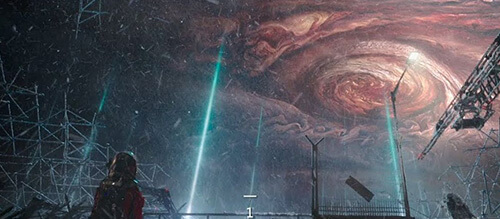The Success and Significance of The Wandering Earth
By far the biggest movie of 2019 is not one you could have guessed. The lofty box office expectations of Hollywood’s big franchise players like Glass and The Lego Movie 2 have yet to be met on a global scale – perhaps the result of a hangover from a plethora of well performing North American releases in late 2018 – but where gaps in the market have appeared, a number of notable foreign language films have been welcomed to fill the void. We’re now in March, and with Marvel’s first big push at the box office due out (Captain Marvel) imminently, native Chinese films make up some 40% of the top 10 grossing movies of the year. The so-called “new Hollywood” and the now certified 2nd largest domestic market in the world is proving its credentials, ushering in the Chinese new year with Chinese-made mega-successes across the board, the local box office topping $1billion in 2019 already.
And the biggest of the lot? The Wandering Earth.
The truly remarkable success of The Wandering Earth has made it not only one of the biggest successes in Chinese box office history after a matter of weeks, but has also seen it all but solidify its space in the worldwide box office top 10 for 2019, the film propelling from an almost unheard of $179,892,945 opening weekend to an overall total of $679.3million as of 4th March 2019.
To put those figures into perspective, only 7 films in the history of North American cinema have ever accumulated more than The Wandering Earth’s opening figure of $179.9million in their opening weekend at the domestic box office, with all other domestic markets only able to look on and weep at such achievements.
But here comes the kicker…
Perhaps even more frighteningly for Hollywood (and arguably more interestingly for us), The Wandering Earth is now at a domestic gross that is higher than all but three North American releases ever. In the history of Hollywood, only Star Wars: The Force Awakens, Avatar and Black Panther have ever made more money in one region than The Wandering Earth has made in around 4 weeks of release. At $679.3million, The Wandering Earth now sits ahead of the likes of Avengers: Infinity War, every Harry Potter movie, every Disney animation, the entire Jurassic Park/Jurassic World franchise and even Titanic in terms of money earned in just one region.
It is simply astounding.
In China alone, there have been over 100 million admissions to The Wandering Earth at domestic cinemas, a total that has now surpassed the record holder Wolf Warrior 2 (Zhang lang II) – itself the surprise box office hit of 2017 and the 4th highest domestic grosser in history (just ahead of The Wandering Earth).
While both films have barely scraped a penny abroad, leaving them outside of the top 100 highest grossing movies of all time, their domestic power cannot be downplayed and their cultural significance cannot be overlooked. After all, 100 million admissions is the equivalent of everyone in the UK (England, Wales, Scotland & Northern Ireland) and Canada going to see the movie on the big screen. Everyone.
And it’s easy to see the attraction…
The Wandering Earth is, to compare it to a mainstream Hollywood release, the Roland Emmerich movie of its time. It is so because it combines an absurd but universally recognisable concept (in this case survival from a catastrophic earth-ending event – which is very Emmerichian) and doses it in gallons and gallons of lighter fluid before setting it all on fire by means of CGI that’s good enough to blow your socks off. It’s your archetypal big budget blockbuster filled with an ensemble of recognisable names, based on a popular pre-existing IP and filled to the brim with visuals you simply can’t find anywhere but on the big screen.
It’s a film clearly influenced by a number of popular American releases too, not least the work of Emmerich on the likes of Independence Day and particularly The Day After Tomorrow. Visually, the film takes a lot of cues from the latter, painting the post-apocalypic-like landscape of China in mountains of snow, while the pseudo-science and space aspects seem to be heavily influenced by the former. Throw in some of American science fiction’s most recognisable tropes – such as the untrustworthy computer program aboard the space station (popularised in cinema to many people through 2001: A Space Odyssey) – and a host of action set pieces (earth bound and star bound) knitting together the plot, and you’ve got what is essentially a big, dumb American blockbuster in the Chinese language.
And this all makes sense. Historically, the Chinese market has been a haven for spectacle driven, CG-fuelled fare, with Fate of the Furious remaining the biggest Hollywood release ever in the country, and typical action movie Wolf Warrior 2 sitting atop of the highest grossing domestic box office chart. The market has also been historically resistant towards subjects they consider to be taboo – such as the use of magic – which has quelled releases from Marvel Studios as well as Star Wars films in the past, opening up a market for the type of blockbusters we rarely get in the English speaking world anymore; films more akin to the 90s mega-hits Armageddon and Independence Day than Infinity War and The Force Awakens.
But there is one more key piece of this jigsaw puzzle…
China is politically communist. The ruling party, which operates strict control over all capitalist ventures from big business to imports and sports all the way to movies, sets the mantra for the people of China, representing a belief system that is therefore naturally more inclined to not only import and push films that support that message, but a people that would naturally support films with strong messages of community over the individual in general. The massive success of Fate of the Furious speaks to this common perception (it’s a “family”-based movie, albeit filled with explosions) and The Wandering Earth also sticks to these go-to guidelines for success, painting a picture of a united earth undermined only by technology and the universe itself; each man, woman and child putting aside their differences for one universal cause and their duty to all mankind.
In one of The Wandering Earth’s climactic moments for example, a rallying cry from a little girl brings about a revolution in the people that ultimately saves the world, illustrating that big change can come from the smallest of people performing the smallest of actions, while the climactic moment sees the earth-bound team of heroes complete half a job together, with the space-bound hero of the piece finishing it off in the last act of unity for all mankind before its successful overcoming of the film’s central-most problem. It is, at the very least, socialist rhetoric celebrating the people. In fact, there is barely a hint of authoritarian control in this movie at all – no president, no boss, barely even a ranking system in the workplaces or squads of rescuers. The Wandering Earth is, therefore, for all of its similarities to North America’s biggest blockbusters old and new, almost quantifiable in how uniquely Chinese it is. It is, for all intents and purposes, a universally recognisable and identifiable story in much the same way as Hollywood’s biggest offerings, only it celebrates a different kind of culture to those of America’s biggest studio releases, and that’s what makes it such a hit in China and such an interesting watch to anyone else around the world.
100 million people saw this movie in one country. You should see it too. The writing won’t blow you away, but the CG is good enough to be compared to any big budget American film and there are moments that could bring a rise out of even the most seasoned of blockbuster veterans. But, mostly… isn’t it always useful to see the world from a different perspective? We’re bombarded with American ideals, politics and culture so often (whether American or not) that it remains interesting and almost insightful to see a big, dumb movie from the other side of the world. Rhetoric and politics aside, The Wandering Earth is hardly work of the highest artistic integrity, nor Earth shattering in how fun it is, but it is important. It’s important because it’s one of the biggest one-region hits of all time, it’s important because of how it represents a coming wave of Chinese films that could come to dwarf the American output for the first time in cinema history, it’s important because it’s popular but it’s different (not only in language but in ideals), it’s important because it is the film of world culture so far in 2019 – the stats don’t lie. See The Wandering Earth (it’s coming to Netflix) and make up your own mind on whether it lives up to Hollywood’s biggest hits, but don’t sleep on the Chinese box office… it has been suggesting to us for years now that for all of its record breaking, the best is yet to come.
[DISPLAY_ULTIMATE_SOCIAL_ICONS]




